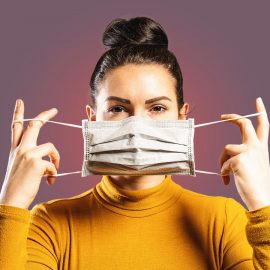Use of face masks
Statement date: 2020
In areas of widespread transmission, with limited capacity for physical distancing, (such as public transport, healthcare settings, or other confined spaces), the use of face masks is recommended. While medical masks provide optimum protection, non-medical masks are still preferable to not wearing a mask in these situations.
It should be noted that masks alone are not sufficient to provide adequate protection against COVID-19. They should however be incorporated in an overall strategy to minimise the spread of respiratory viruses such as COVID-19. Maintaining physical distance of at least 1 metre (more if possible) along with frequent hand washing and use of face masks offers the most effective means of protection.
In addition:
- To be effective a mask needs to cover both the nose and the mouth
- Masks become less effective when they get moist so should be replaced if this happens
- Avoid touching the outer facing surface of the mask as contamination can be an issue when removing and disposing of it.
- Masks should not be used as a substitute for physical isolation. Anyone with symptoms should not leave isolation unless for the purpose of seeking medical assistance.
